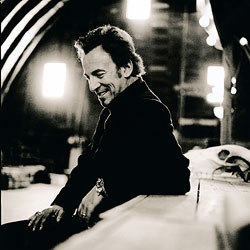BRUCE SPRINGSTEEN
Devils and Dust
(Sony)
If Bruce Springsteen’s music is, as the Hold Steady’s Craig Finn recently put it in these pages, “both timely and timeless,” it’s unfortunate that the Boss’ stories of everymen ruined while trying to build better lives rang so true nobody believed them, like Pancho Villa’s films of his forays into America. The red-state climate that allowed for the co-opting of “Born in the U.S.A.” by Ronald Reagan now coats Springsteen’s lyrics in message-deflecting irony. In today’s wintry political climate, though, it’s not a disabled veteran’s woe that’s putting Springsteen’s core demographic off its feed, but good old-fashioned anal sex, whose price is negotiated with a hooker in Devils and Dust‘s “Reno.” Against a sparse backdrop, Springsteen’s narrator attempts to relive lost love, with the prostitute as his co- conspirator. No penetration occurs in the song; in fact, Springsteen rushes out the word “ass,” pronouncing it through gritted teeth. Springsteen has essentially written a concept album about the abject failure of manifest destiny. Old West metaphors and instrumentation provide the necessary distance that keeps Devils and Dust from didacticism. “Fear’s a powerful thing,” Springsteen sings, and as ever, it’s also his characters’ motivation. Rainey Williams’ one-man diaspora in “Black Cowboys” is born of Williams’ fear of letting inertia and racism keep him from his claim on history. As Bruce sings in “The Hitter,” “I move hard to the left and I strike to the face.” If it’s what he has to do to get the attention of the Starbucks mafia, then so be it. DONNA BROWN
KRAFTWERK
Minimum-Maximum
(Astralwerks)
Kraftwerk weren’t exactly stars in America—their 1973 single “Autobahn” peaked at No. 25 in Billboard, their only “chart” hit—but their stiff, android personas and love songs about calculators had an explosive effect on pop culture, influencing everything from Devo to the “Sprockets” sketches on Saturday Night Live. Oh, and they pretty much invented techno. Yet for all their impact, Kraftwerk were notoriously loath to perform live. In rare interviews, they would wish that robots could tour in their place, so they could stay in Düsseldorf and keep to their rigorous schedule of composing, bicycling, and coffee drinking. So when Germany’s answer to the Beach Boys hit the road last year for the first time since 1998, their limited U.S. dates drew worshipful crowds of technophiles—Seattle concertgoers begged for an encore by holding their cell phones in the air—and Minimum-Maximum, their first live album, captures their iconic style and, yes, humanity. Artfully sequenced from performances around the globe, the album covers the group’s 30-year history, from the delicate synth-pop of “Radioactivity” and “Neon Lights” to the prototype electro of “Numbers” and “Computerworld.” Even though it’s meticulously constructed—it is a Kraftwerk product, after all—you still hear the subtle slips and rough transitions that show the humanity behind the machine. You also get a sense of the devotion of the group’s following, especially in the rousing Japanese sing-along to “Dentaku,” the local-language version of their 1981 hit “Pocket Calculator.” It’s a great way to take home the memories, but it’s also a perfect introduction if you don’t know them from Dieter. MATTHEW CORWINE
MAXÏMO PARK
A Certain Trigger
(Warp)
Why would Warp Records sign the sort of expressively rocking, song-centric outfit that the label’s no-faced electronica was supposed to have crushed to dust forever? Possibly because Newcastle quintet Maxïmo Park’s early single “The Coast Is Always Changing,” reprised here, is a damn near perfect parlay of bitten-off ensemble riffs, single-stroke tom and cymbal fills, and ripe C86 foppery: “I am young and I am lost/You react to my riposte.” Its only true equal on their debut is the manic “Now I’m All Over the Shop,” with a killer bridge and a couplet (“I know you’ll be fine/Now that you’re not mine”) that neatly sums up frontman Paul Smith’s wrist-to-forehead view of romance. When the hooks falter, Smith’s proudly northern vocals carry “Going Missing” and “The Night I Lost My Head” as if by sheer nerve; if nothing else, the band deserves points for making Lukas Wooler’s independent keyboard lines and the rhythm section’s dropped beats and extra measures more integral to the songs than, say, the Futureheads’ quirk-for-quirk’s-sake. Forays into white Motown (“Postcard of a Painting”) and, inevitably, white funk (“I Want You to Stay”) clunk along endearingly, but the disc’s sole ballad, the soggy, psycho-candied “Acrobat,” reveals the limits of their current range. In the U.K., A Certain Trigger has gone Top 20 on the strength of “Graffiti,” accompanied by an overdesigned video that tellingly shunts the group’s husky bassist into the sidelines, Ann Wilson–style; stateside, I predict a (highly controlled) riot. FRANKLIN BRUNO




